Step-by-Step Instructions
- Form pairs.
- Distribute one UBUNTU Card to every person.
- When ready, each person shows the multi-image face of their card to their partner.
- The first person to identify the one object that appears on both cards wins.
- Next, invite each pair to have a conversation in which they explore something they each have in common.
- After a minute of conversation, each person swaps cards and seeks out a new partner.
- Continue this process of seeking commonalities for 5 to 10 minutes.
- Try one or more variations.
Buy UBUNTU Cards
Resources
Here’s a quick introductory video to learn more about this highly versatile team-building resource:
Order Now
Video Tutorial
Video Transcript for UBUNTU Cards
presented by Mark Collard
Just take a card. It won’t matter what it is or what you get. They’re all different. Take a card or take the one I give you, as the case may be.
Right. Now these are really cool. This is new. I just come back from the States a few weeks ago, so a colleague work with these. They’re called UBUNTU Cards.
I don’t actually know the origin, but I’m told that it may have something to do with what you have in common. It could be a great story, but I like it, so that’s what I’m going to run with.
So what you’ll notice is there are two sides to your card. There’s a very big picture. And there are 54 cards in this set. Every picture is different. So that the big picture. I’ve got for example, a dice.
Sharon, you’ve got a toy penguin. Excellent. Are these the extras? Thank you. On the other side you’ll notice that there are smaller versions of the big things, okay?
I don’t understand how this works, folks, but every pair of cards, so we might look at our two cards, there’s always one thing that matches.
So that is… I’ll find something on my card that’s also on Sharon’s card. I swear at least one group of pairs will come up to me and say Mark, we’ve found the anomaly, we’ve found where it doesn’t work, and every single time I’m able to show them where it is.
It’s amazing. I don’t know how they do that. Only eight things on the card, but somehow…
(How many cards?)
There are 54. Now you’re trying to work out the math now? Get back to me on that one, would you?
So here’s the activity. Start with a partner, for example Sharon and I might be facing off. You might want to introduce yourself if you choose, if you don’t already know each other. And we’re going to go one, two, three, and you show the little side up.
Our objective is quickly to identify which one item is the one that matches. So…
(Hammer!)
Okay, great. So in this case, she wins. It doesn’t really mean anything, but she’ll feel really good about it.
And so Sharon feels good, and then we find something we each have in common. So we just found something that was in common with our cards, we know have a quick chat to find out which one thing we have in common.
It would be very easy for you to say oh, we’re both members of ACHPER and then you move on, except I’m going to ask you to go to another level. It might be that we both have two sisters, or the last digit of our mobile phone numbers is the same.
I don’t mind, but find something unique about what you might have in common. It’s kind of crazy.
Once you’ve found it, great. Swap cards, go find yourself a new partner and do exactly the same. You keep swapping cards each time you find a match and have that conversation. Got the idea? Go!
(people playing UBUNTU Cards)
How To Play Narrative
These cards are my latest, favourite prop – here’s just one of a zillion of ways to use them.
Distribute one card (there’s 54 in the pack) to each person in your group. Describe that there are two sides to each card, every one of them different.
On one side, there is a large picture of a unique object such as a hammer, a rubber chook or a model train. On the other side, there are eight smaller images selected from the 54 larger items.
Now, I’m not a mathematician, but somehow any two cards will always have one item in common among these eight images. Crazy, I know! But it works every time.
Ask your group to mingle and find a partner. On “GO” each person flashes the multi-image side of their card so that each of them can see both cards face-up. The first person to identify the common image/object earns a brownie point!
From this point, you can take one of many routes. You could, for example, simply ask that each person finds a new partner to continue playing. Or, even better, once the match is identified, ask each partnership to have a quick chat to discover at least one thing that they have in common – but – encourage them to look beyond the obvious.
Then, each person swaps UBUNTU Cards and returns to mingling to seek out a new partner. If commonality is not found within a minute, each person will thank their partner for the conversation, then swap cards anyway.
Repeat many times over the course of 5 to 10 minutes.
Then, try something new from one of dozens of ideas as described in the Variations tab.
Practical Leadership Tips
Take a look at What Is An Ice-Breaker? article to help you present successful ice-breaking experiences every time.
Word of advice – get your own set of UBUNTU cards. I. Love. These. Cards. If I was told that I could only use one prop for the rest of my training career, I would choose these cards. Click here to buy one or more sets of UBUNTU Cards today!
The UBUNTU cards set comes with its own instruction sheet which features 18 different ways to use the cards (both single- and multi-image sides) to invite interaction, connection and sharing.
A useful tip – encourage pairs when discussing what they have in common, to go beyond the obvious, eg “We’re both women.” Challenge them to look for something that is not obvious or more interesting or surprising commonalities such as “We both drive a Volkswagen,” or “We have both visited the San Diego Zoo,” or “We both broke our arms when we were young.”
One of the attributes of these cards that helps make them so successful in encouraging people to share is that, often, the focus is on the cards, and not on the individuals, thus making the interaction less threatening.
UBUNTU cards are almost bereft of words, so they are ideal for use with people all over the world, no matter their native language.
That said, there are 11 words hidden throughout the cards – can you find them all? You may need a magnifying glass to discover some of them. They are Leadership, Hope, Respect, Teamwork, Fun, Patience, Ideas, Motivation, Helpful, Inspire & Confidence.
Oh, and there are three objects featured on the multi-image side that are not represented on the single-image side. Do you know what they are? Tell me when you discover the answer!
FYI, this set of unique cards was developed by Ryan McCormick, from High-5 Adventure Learning Center, in Vermont, USA. The images were sourced from objects Ryan found in his own home, indeed, several feature drawings were created by his beautiful daughter Hannah.
Proceeds from the sale of UBUNTU Cards help support High 5’s Edge of Leadership Program which is designed to help young people discover and refine their leadership skills. Awesome!
Social-Emotional Learning
You could integrate UBUNTU Cards as part of a well-designed SEL program to promote and maintain healthy and supportive relationships and to effectively navigate settings with diverse people.
Specifically, this activity offers ample opportunities to explore and practice the following social & interpersonal skills:
Self-Awareness
- Identifying Personal, Cultural & Linguistic Assets
- Recognising Strengths, Prejudices & Biases
- Demonstrating Self-Confidence, Honesty & Integrity
- Experiencing Self-Efficacy
Self-Management
- Demonstrating Self-Discipline & Self-Motivation
- Setting Personal & Group Goals
- Taking Initiative
- Use Planning & Organisational Skills
Social Awareness
- Taking Other’s Perspectives
- Demonstrating Empathy & Compassion
- Understanding & Expressing Gratitude
- Appreciating Diversity
- Recognising Strengths In Others
- Respecting Others
Relationship Skills
- Communicate & Listen Effectively
- Seeking and/or Offering Support
- Build Positive Relationships
- Demonstrate Cultural Competency
- Work Collaboratively
Responsible Decision-Making
- Demonstrating Curiosity & Open-Mindedness
- Promoting Personal & Collective Well-Being
You can learn more about SEL and how it can support character education here.
Health & Wellness Programming
There is no specific health & wellness perspective to this activity other than promoting the benefits to one’s well-being of enjoying lots of healthy social interaction and a few laughs.
In a small way, you could argue that the focus required to interact and engage socially with others may speak to the benefits of having developed a set of supportive and healthy behavioural norms in advance. Or, if not, you could use these less-than-desired interactions or outcomes to explore what sorts of behaviours your group would prefer to see. For example, you could invite your group to reflect on the types of interactions that demonstrate and embrace diversity, inclusion and equity and relate these to a set of observed impacts on others.
If you can think of more explicit ways in which UBUNTU Cards could be purposefully integrated into a health and wellness program, please leave a comment at the base of this page.
Popular Variations
- Blind Paired Match: Partners stand back to back, or facing one another without looking at the other’s card. One person starts by describing one of the eight smaller objects on his/her UBUNTU Card – but, without mentioning the object’s name. They can describe its use, colour, shape, where it may be found, etc. Once a match is discovered, the partners are then invited to explore what they each have in common with the other.
- Memory Test: In pairs, each person studies their own UBUNTU Card for 30 seconds, trying to memorise all of the objects on their card. Then, without looking at their card again, each person shows their card to their partner – the first person to identify the match, wins.
- Find & Flee: Over the course of sixty seconds, each person aims to audibly spot the matching object between their own card and that of another. As soon as a match is spotted, the spotter immediately swaps these two cards and then flees to another person to start over. Earn one point for every Find and Flee. The person with the most points in the round wins.
- Circle Match: Your group forms a circle, two people standing next to each other show their UBUNTU Cards, multi-image facing up. As soon as one of the pair identifies the matching object, the person to the left of the pair shows their card with a view to identifying the match with the partner to their right. This process continues around the circle, involving all of the pairs, as fast as possible.
- Time Trail: Place 5 Ubuntu cards in a row on a table in front of yourself. Face all cards single-image side up, except for the first card. When ready, start the timer and immediately flick the second card to reveal its multi-image side. As soon as you can identify the match, flick over the third card, and so on, until all five pairings (the fifth and first card are the last pair to match.) Shuffle and deal another five cards, and repeat several times to record your best time.
- Small Group Time Trial: In small groups of 3 to 5 people, invite everyone to record their best time to identify the paired matches above. Then join sets of two people together and record their best times as a pair (the presumption is that two sets of eyes are better than one, so the times should get faster – but not always!). Eventually, invite the whole group to work together. Analyse the results, and discuss what happened.
- TPOT: This acronym stands for That Person Over There (kudos to Phil Brown for this naming convention.) With single-side facing up, each person selects a card and finds a partner to interact with. Each person shares why they picked their card and then swaps cards. Each person is then instructed to introduce their (most recent) partner by sharing the information they learned about them with their newest partner. Share, swap, and repeat.
- UBUNTU Categories: Using the single-image side, individuals attempt to find other people holding a similar card to them according to whatever category they identify, eg colour, mechanical, organic, size, etc.
- Commonalities: Form pairs and focus on the single-image side of the cards. Ask each partnership to find as many things each of their two objects have in common. Allow a minute for conversation, and then invite a few people to share what they discovered. It’s nigh impossible not to find something in common in every pairing of cards – a useful insight into the human condition and our proclivity to quickly judge people who are different to ourselves.
- Competition 1: Split the deck evenly between two (or up to four) people and face all cards multi-image side up. Remove one card from any deck and place it in the middle, multi-image side up. When ready, each person aims to identify a match on the card in front of them with the card in the centre. The first person to (audibly) identify the match and place their card (from their pile) on top of the card in the middle will successfully get rid of one card from their pile. The first person to get rid of all of the cards in their pile wins.
- Competition 2: As above, but in reverse. All cards start in the middle, and each individual starts with one card in front of them. The process of audibly identifying the matches continues (this time cards are snatched from the centre pile and placed multi-image side up on their own pile) until all of the cards in the centre are gone. The person with the most cards in their own pile wins.
- Sharks in the Pool: Distribute one card (face-down) to every person, ensuring several cards (at least) have a shark on the multi-image side. When ready, everyone flips their card to see the multi-image side. If their card has a shark on it, they attempt to tag others (fish) whose cards do not feature a shark. Invite all sharks to hum the Jaws theme (DaDum…DaDum…DaDum…) for fun. Upon making a tag, both the shark and the fish flash their multi-image side of their cards, hoping to be the first person to spot the common object. If the fish wins, they are free to swim away. If the shark wins, the two people swap roles, ie fish becomes a shark and starts chasing other fish. The game ends when everyone becomes a shark or your group is exhausted from too much fun.
- Alphaquential: Challenge your group to assemble as many cards as possible in a sequence according to the alphabetical order of nouns. Start with a card with an A noun (eg Ant) AND a ‘B’ noun (eg Bulb) on the multi-image side. Then, find another card that has a B noun and a C noun, and so on. How far can you get? Thanks to Chris Cavert for sharing this.
- Competitive Edge: Use UBUNTU Cards as an instrument to identify a ‘winner’ in activities such as Ro Sham Bo, Around The World and Evolution.
- Avatar: In advance, ask each person to select one of the UBUNTU Cards as their avatar (this process could be random or selected for a reason.) Then, use this card as a token to identify the physical presence of each person in certain activities, eg Comfort Zones and Spectrums. This strategy is especially useful when adhering to physical-distancing protocols.
- Versatile Cards: Take a look Fine Line Cards, We Connect Cards, Climer Cards and Emoji Cards if you enjoy the simple pleasure of using awesome props in your programs.
- Check out many more UBUNTU Card variations posted on the official UBUNTU Collaborative Resource page (as moderated by my good friends at High 5 Adventure Learning Center, USA.)
You Might Also Like...
 5
5
Categories Twist
Small group bonding activity & fun variation of Two Truths...
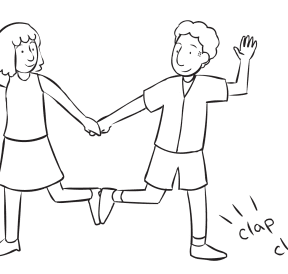 3
3
BF Skinner
Large group game that creates instant fun with audience interaction.
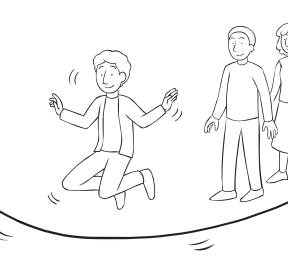 2
2
Turnstyles
Energetic group initiative to teach systems-thinking.
Virtual Adaptation
- Form pairs of participants in advance. One pair at a time, challenge each person forming a pair to be the first to identify the match in the two cards you hold up in front of your webcam. To identify the winner, they must be the first to type in the name of the object in the chatroom, ie this avoids any issue of internet lag. Hint – ask everyone to pin your video on their screen, or ask them to switch off their microphone (mute) so that the image of the cards does not disappear when someone talks.
- Team Events: As above, but form small teams of 2 to 4 people. The first person to enter the correct matching object wins a point for their team.
Useful Framing Ideas
Have you heard of the word UBUNTU before? It is an African word which describes that ‘there exists a common bond between us all’ or that ‘I am because we are.’ This is true. And yet, while every one of us is unique, there are many bonds which unite us all. This exercise celebrates both this diversity and unity…
How often have you felt that you had nothing in common with others around you? At a party, or starting at a new school, or job? Perhaps you just see things differently to others? No matter, when we begin to dig a little deeper, beyond the superficial outer layers, we often discover that we have many attributes in common with those around us. Your challenge is this exercise is to explore these areas of commonality…
Reflection Tips & Strategies
Coupled with one or more reflection strategies, here are some sample questions you could use to process your group’s experience after playing this highly interactive and fun series of games:
- What made it difficult to identify the matching object on two cards?
- Was it difficult for you to identify a unique thing you had in common with some of your partners? Why?
- Generally, speaking, what do we as humans often focus on – commonalities or difference? What are examples?
- What effort, if any, is required to identify a commonality with others?
- In what areas of your life do you think you have lots in common with others?
- Do you find yourself in places with little in common with others? Where?
- What is the value of seeking common bonds with people we do not know or like? Do you have examples?
Program Templates
Highly Interactive & Fun ‘Ice-Breaker’ Session
What You Need:
8+ people, 20 mins, deck of UBUNTU Cards
- Five Handshakes in Five Minutes – highly interactive greeting exercise
- Gotcha – a sure-fire game that is guaranteed to generate lots of laughter
- UBUNTU Cards – non-threatening, interactive activity which focuses on the common bond which exists in your group
Simple, Introductory ‘Team-Building’ Program
What You Need:
8+ people, 60 mins, deck of UBUNTU Cards, hula-hoop, stopwatch
- UBUNTU Cards – non-threatening, interactive activity which focuses on the common bond which exists in your group
- Me You You Me – unique, hilarious name-game for new and existing teams
- Mute Line-Up – introductory challenge which focuses on effective communication
- Circle The Circle – simple initiative which develops effective team skills
- Whip Around – quick debrief strategy which invites your group to explore what it has learned during this one-hour program
Source
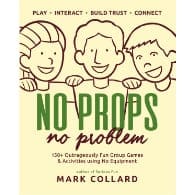
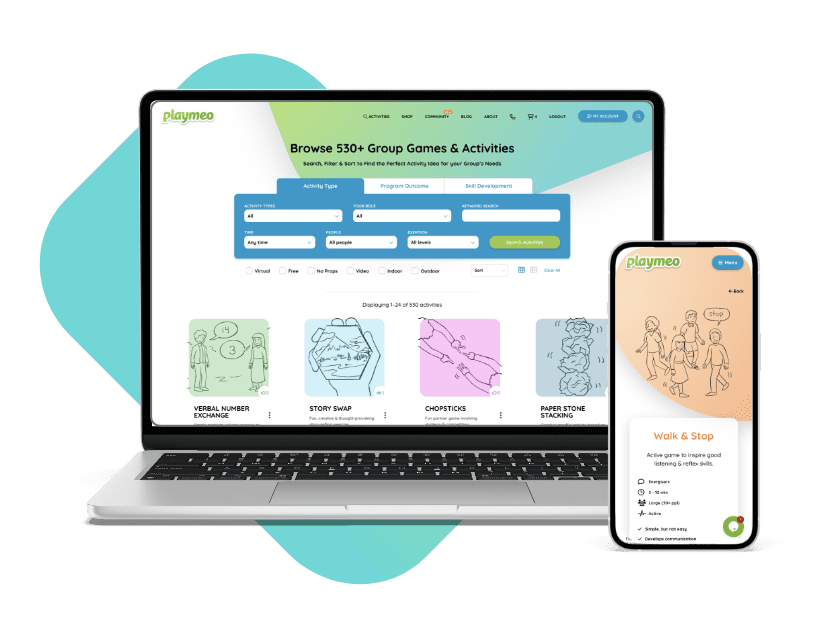





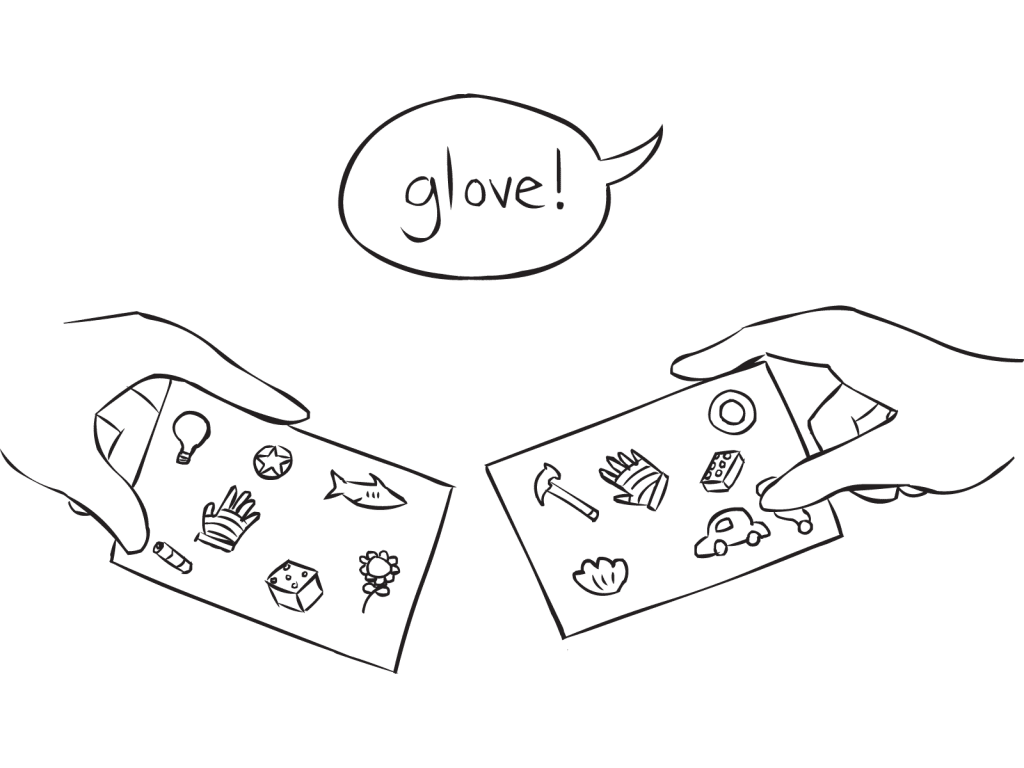



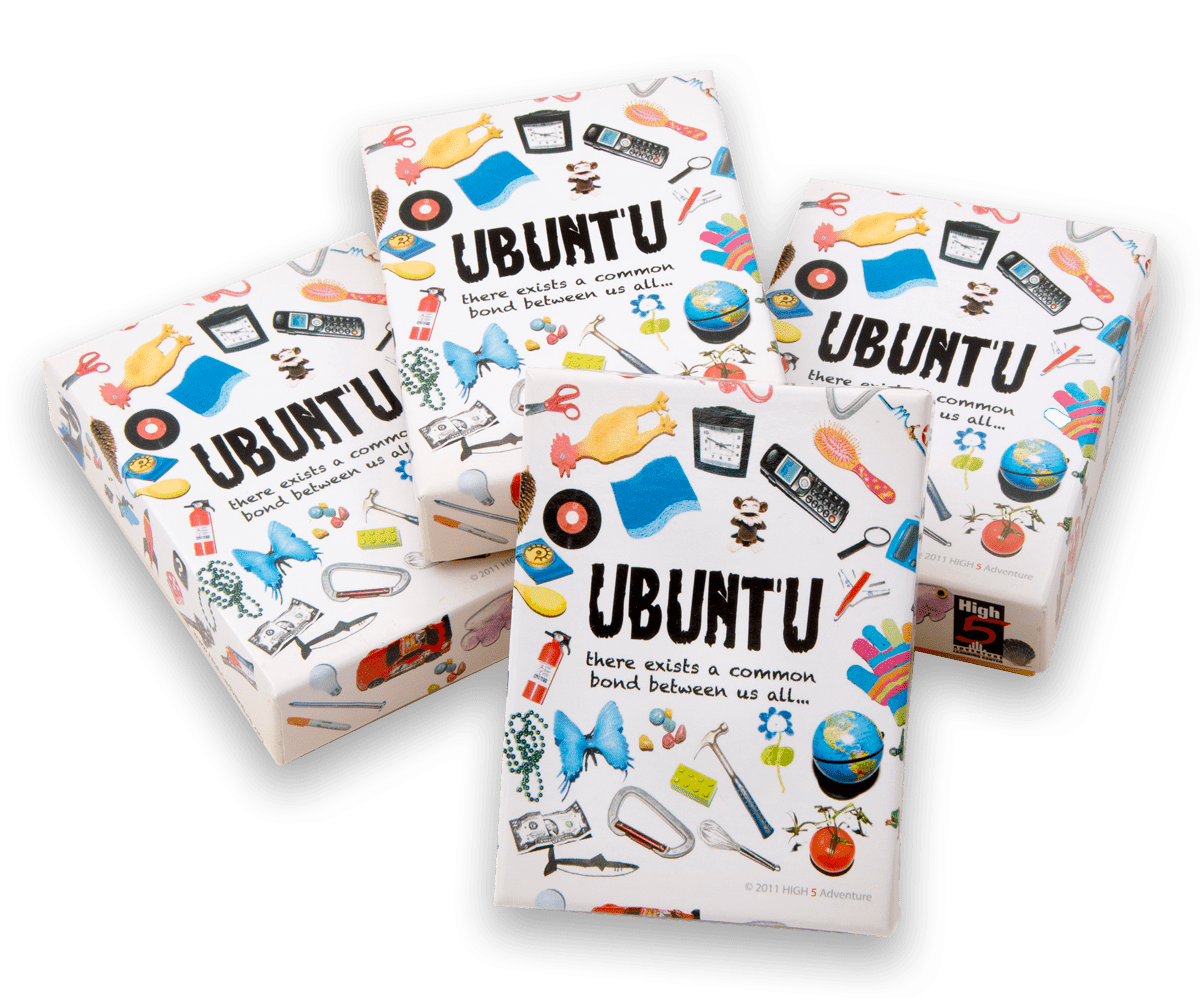



Like the Spot it game.
Yes Claire, the design of the UBUNTU CARD deck is similar to Spot It cards – the biggest differences are that UBUNTUs are double-sided and are intended for facilitating conversations about ‘UBUNTU’ that is, to help people connect and discover that we have many common bonds that bind us all. Enjoy!